Yes, rosemary is more than a fragrant kitchen herb — it offers powerful, science-backed benefits for your brain, heart, and overall wellness.
This Mediterranean evergreen, known botanically as Rosmarinus officinalis, has been prized for centuries for both culinary and medicinal uses. Modern research confirms that its bioactive compounds — such as carnosic acid, rosmarinic acid, and ursolic acid — provide potent antioxidant, anti-inflammatory, and neuroprotective effects.
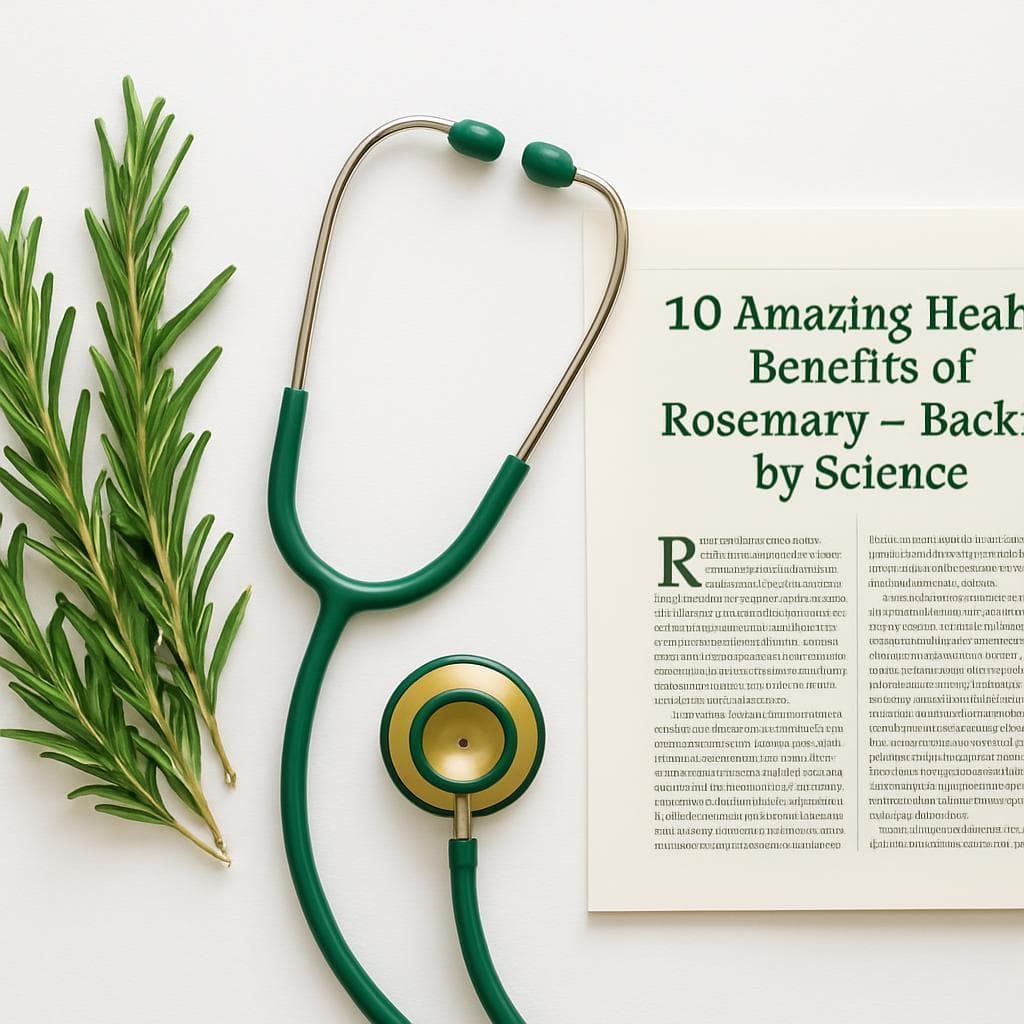
Understanding rosemary’s benefits helps you make informed choices about how to use it safely and effectively — whether through diet, essential oils, or herbal supplements. Below, we explore 10 evidence-based health benefits of rosemary, plus practical tips, safety guidance, and FAQs.
What Is Rosemary? (Overview and Nutritional Profile)
Rosemary (Rosmarinus officinalis) is a fragrant evergreen herb native to the Mediterranean region, widely used as both a culinary seasoning and traditional medicinal plant.
It belongs to the mint family (Lamiaceae), along with basil, oregano, and thyme. Its needle-like leaves and aromatic oils make it a staple in both kitchens and herbal medicine cabinets around the world.
Botanical Overview
- Scientific name: Rosmarinus officinalis L.
- Family: Lamiaceae (mint family)
- Plant type: Woody perennial herb
- Native regions: Mediterranean basin (Spain, Italy, Greece)
- Active compounds: Carnosic acid, rosmarinic acid, ursolic acid, camphor, eucalyptol
These compounds are responsible for rosemary’s antioxidant, anti-inflammatory, and neuroprotective effects, as confirmed in numerous scientific studies published in the Journal of Agricultural and Food Chemistry and Frontiers in Pharmacology.

Nutritional Profile (Per 1 Tablespoon of Fresh Rosemary — ~2g)
(USDA FoodData Central, 2024)
| Nutrient | Amount | % Daily Value |
|---|---|---|
| Calories | 2 kcal | — |
| Carbohydrates | 0.4 g | <1% |
| Fiber | 0.3 g | 1% |
| Protein | 0.03 g | — |
| Vitamin A | 22 IU | 1% |
| Vitamin C | 0.3 mg | <1% |
| Calcium | 8 mg | <1% |
| Iron | 0.2 mg | 1% |
| Potassium | 9 mg | <1% |
While small in quantity when used as a spice, rosemary’s bioactive polyphenols (especially carnosic acid and rosmarinic acid) make it unusually potent in terms of antioxidant capacity relative to serving size.
Phytochemical Highlights
- Carnosic Acid & Carnosol: Protects brain and skin cells from oxidative stress.
- Rosmarinic Acid: Anti-inflammatory and antimicrobial properties.
- Ursolic Acid: Supports metabolism, collagen synthesis, and immune balance.
- Eucalyptol & Camphor: Responsible for rosemary’s distinct aroma; beneficial for respiratory and cognitive function.
According to the National Institutes of Health (NIH), rosemary’s total antioxidant capacity (measured by the ORAC method) ranks among the highest of common herbs, surpassing sage and thyme.
Source: USDA FoodData Central | PMC – Rosemary Compounds and Health Effects
10 Amazing Health Benefits of Rosemary
1. Rich Source of Antioxidants and Anti-Inflammatory Compounds
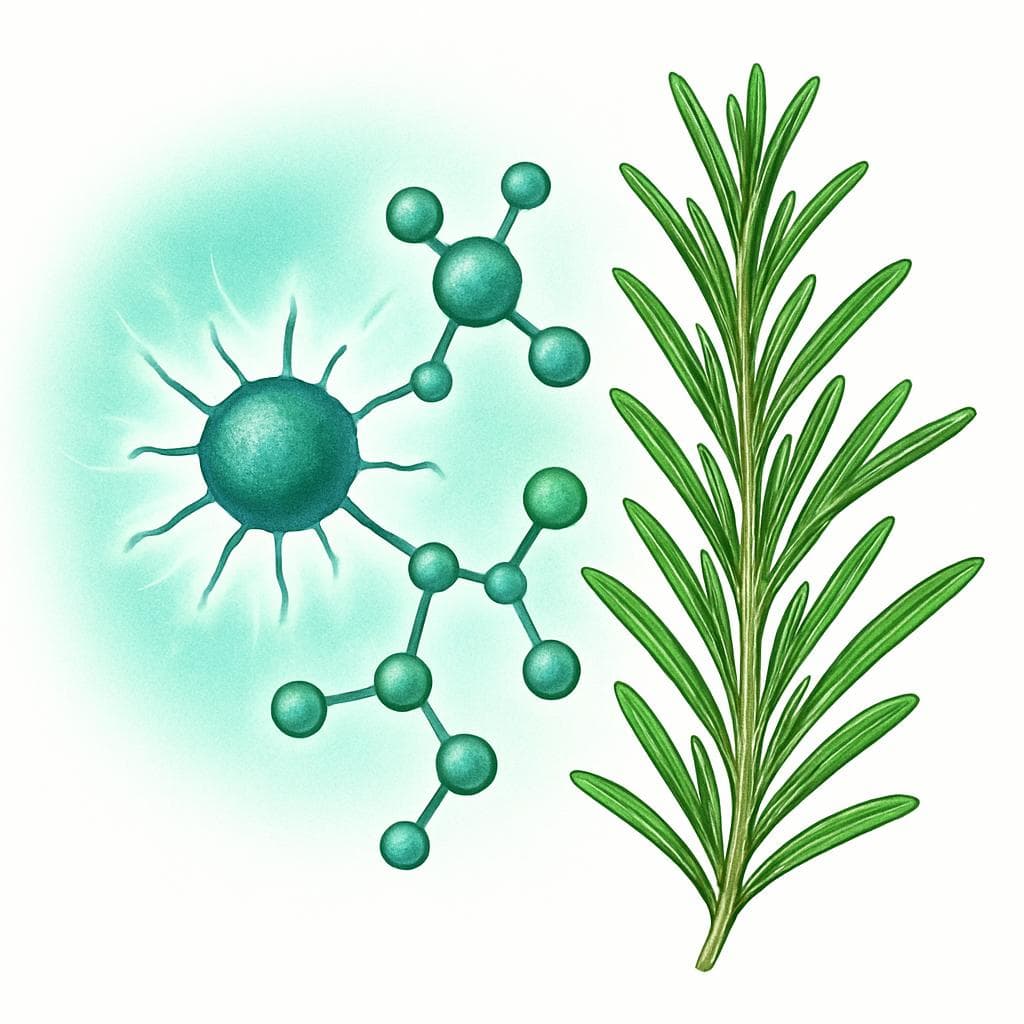
Rosemary is packed with powerful phytochemicals — notably carnosic acid, rosmarinic acid, and carnosol — which act as strong antioxidants and inflammation modulators.
According to a 2023 review in the Iranian Journal of Basic Medical Sciences, rosemary’s polyphenols help neutralize free radicals and protect body tissues from oxidative stress, a major contributor to aging, cancer, and heart disease.
Key compounds:
- Carnosic acid: shields brain and skin cells from oxidative injury
- Rosmarinic acid: reduces inflammatory cytokines
- Ursolic acid: supports cellular repair and immune balance
Source: National Library of Medicine (PMC7491497)
2. Enhances Memory and Cognitive Function

Rosemary is often called the “memory herb” — and science agrees.
A 2022 meta-analysis found that rosemary extract improved learning and memory scores in both healthy and cognitively impaired animals. Human studies also show that inhaling rosemary aroma can improve accuracy and alertness.
How it helps:
- Inhibits acetylcholinesterase, an enzyme linked to memory loss
- Boosts circulation to the brain
- Reduces oxidative damage to neural tissues
Source: PMC8851910 — Cognition Enhancing Effect of Rosemary
3. Improves Mood, Focus, and Stress Response

Inhalation of rosemary essential oil has been shown to reduce cortisol levels, improve alertness, and enhance mood.
A controlled trial published in Therapeutic Advances in Psychopharmacology observed that participants who inhaled rosemary reported greater calmness and clarity compared to placebo.
Why it works:
- Aromatic compounds stimulate the limbic system (emotional brain)
- Reduces cortisol (stress hormone)
- Improves oxygen supply to the brain
Source: Medical News Today – Rosemary Health Benefits
4. Supports Brain Health and Neuroprotection

Rosemary’s neuroprotective effects stem from its ability to fight inflammation and oxidative damage within the brain. Carnosic acid activates cellular defense pathways, which may slow cognitive decline.
Animal studies suggest rosemary could reduce beta-amyloid buildup — a key factor in Alzheimer’s disease.
However, human data are limited, so rosemary should be viewed as supportive, not therapeutic.
Source: PMC7491497 – Rosemary and Nervous System Disorders
5. Promotes Healthy Skin and Hair

Rosemary oil and extract are gaining popularity in dermatology for their anti-aging and hair-stimulating properties.
A 2022 review found rosemary extract protects skin cells from UV-induced damage and supports collagen production.
In a randomized trial comparing rosemary oil to 2% minoxidil (the active ingredient in Rogaine), rosemary showed comparable results in improving hair thickness after 6 months.
Source: Healthline – Rosemary Oil for Hair Growth
6. Provides Antimicrobial and Wound-Healing Benefits
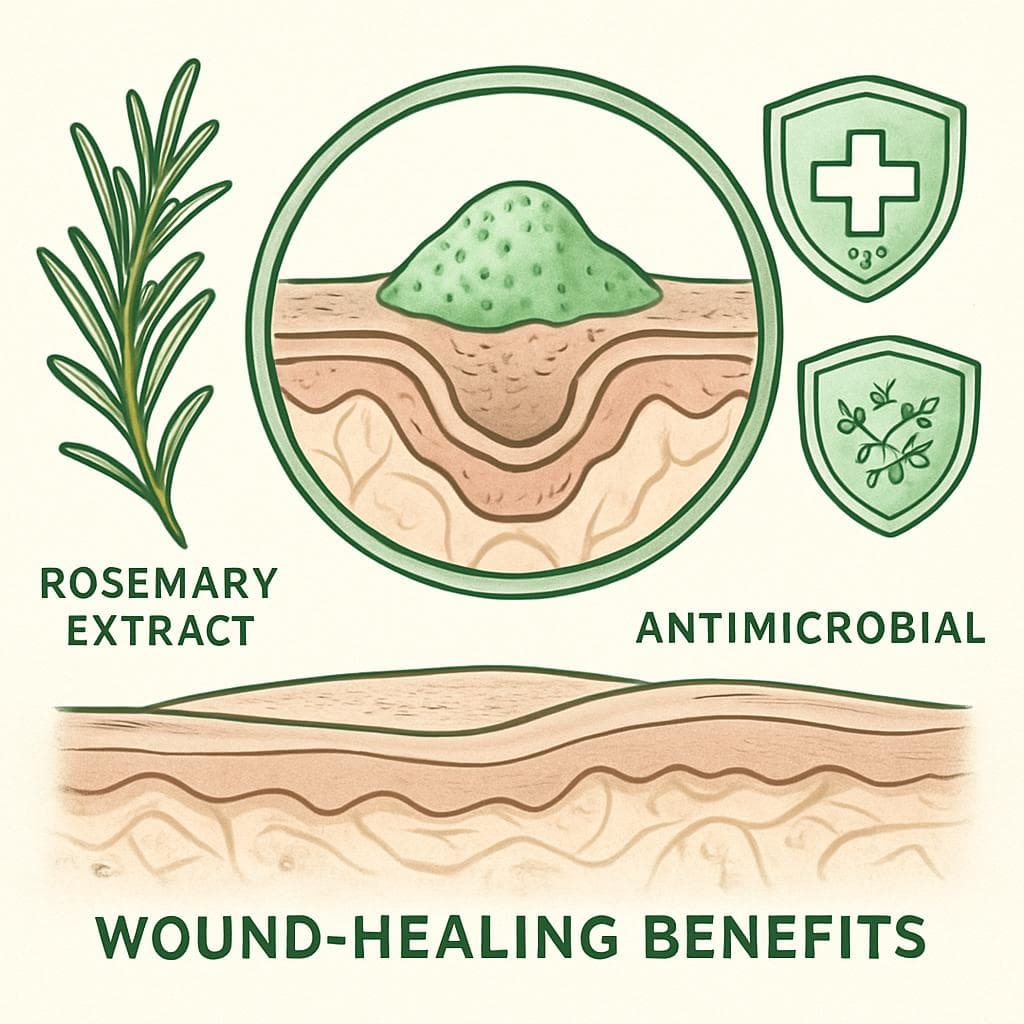
Rosemary essential oil contains eucalyptol and camphor, known for antibacterial, antifungal, and wound-healing effects.
Laboratory studies show it inhibits growth of Staphylococcus aureus and Candida albicans, common skin pathogens.
However, use essential oil only when properly diluted, as it can irritate sensitive skin.
Source: PMC10045493 – Rosmarinus officinalis and Skin
7. Aids Digestion and Gut Health
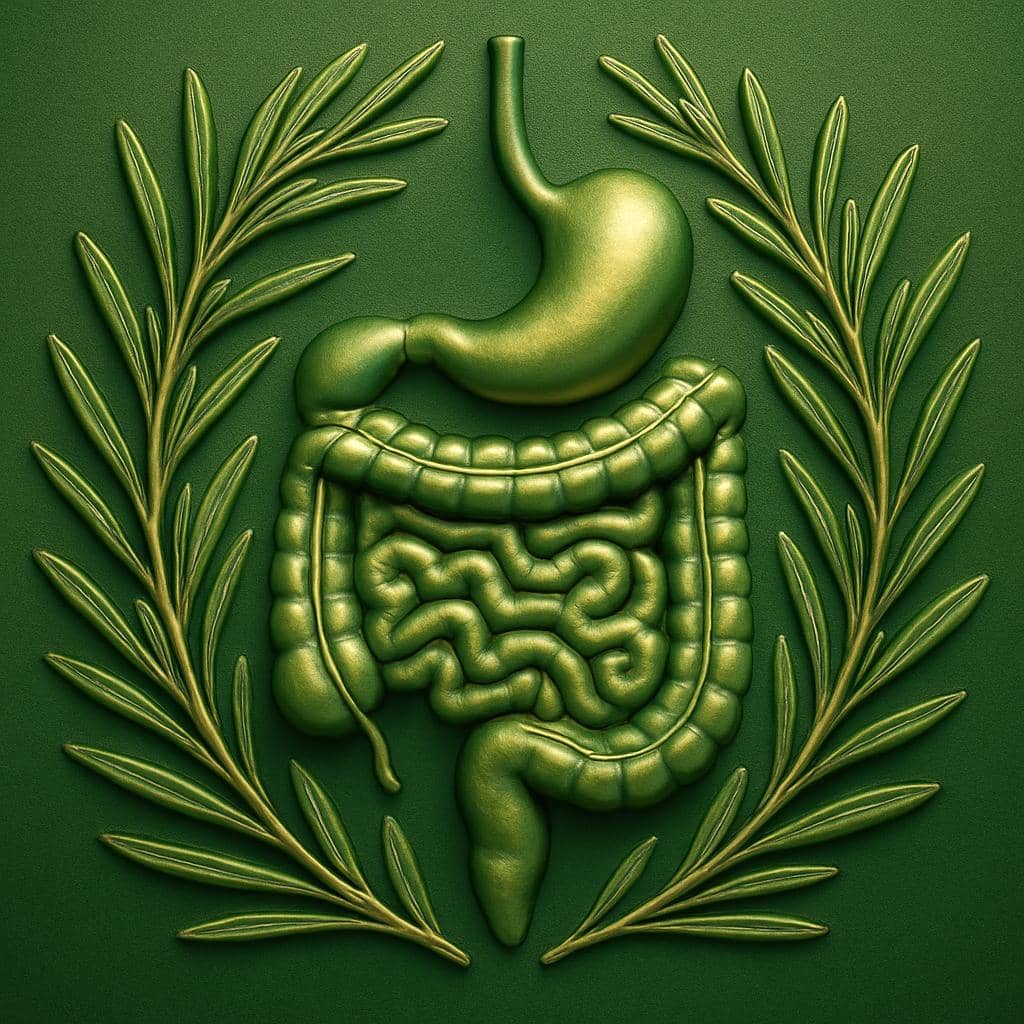
Traditionally used for indigestion, rosemary may ease bloating and stimulate bile flow.
Animal studies indicate that its extracts help reduce intestinal inflammation and improve gut microbiota balance.
Practical tip: Drinking rosemary tea after meals may support gentle digestion and reduce heaviness.
Source: PMC8513767 – Rosemary and Gastrointestinal Protection
8. Helps Balance Blood Sugar and Cholesterol Levels
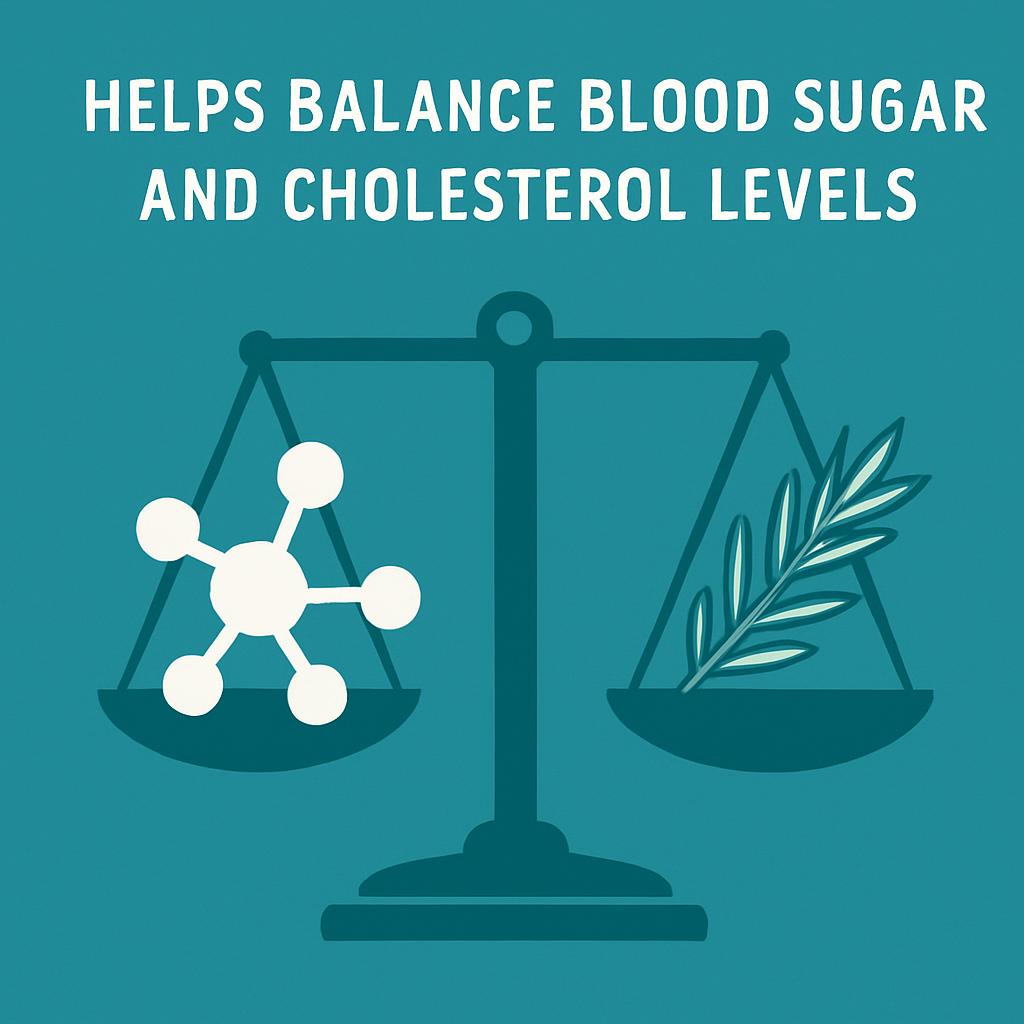
Emerging evidence shows rosemary may improve blood glucose control and lipid metabolism.
A 2023 overview by the McCormick Science Institute noted that rosemary compounds may enhance insulin sensitivity and protect against LDL oxidation.
What this means: Regular consumption of rosemary could modestly support cardiovascular health when combined with diet and exercise.
Source: McCormick Science Institute – Health Benefits of Rosemary
9. May Reduce Pain and Inflammation
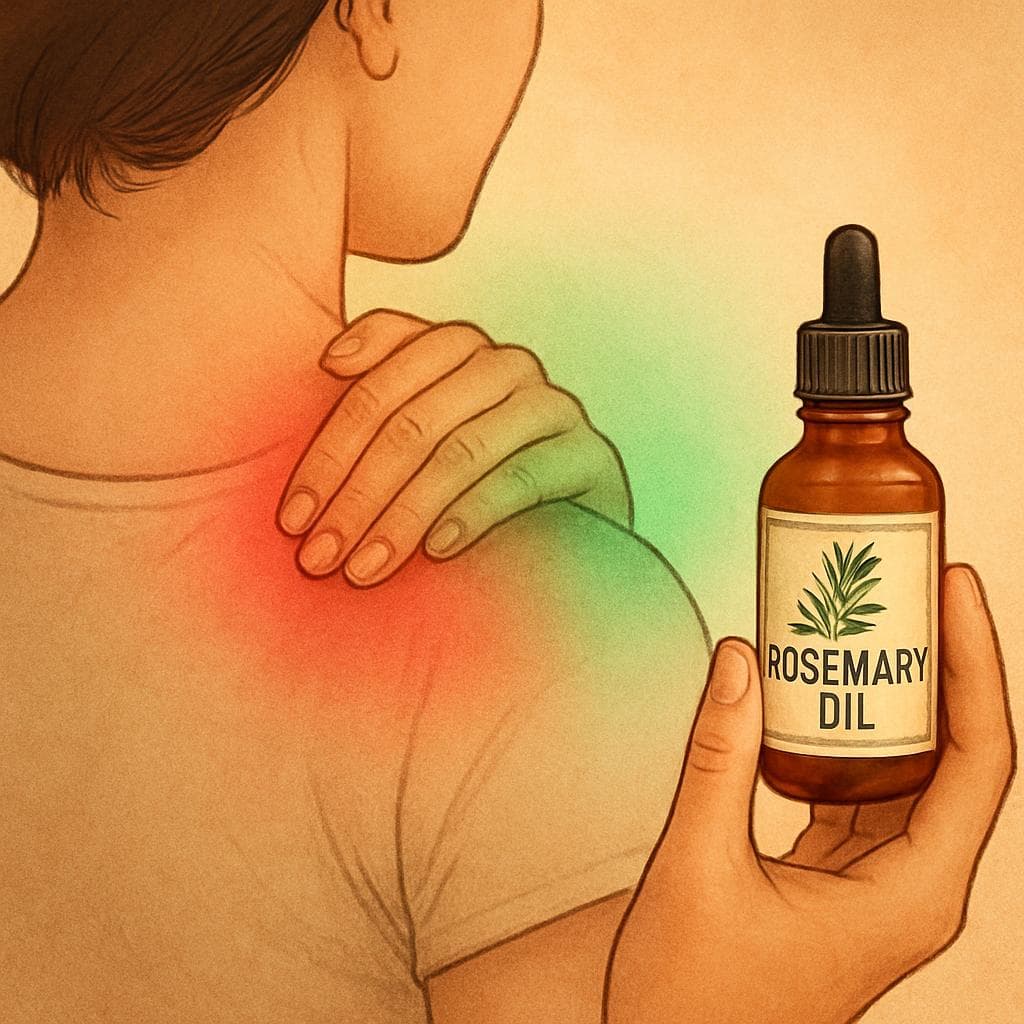
Rosemary’s natural analgesic (pain-relieving) action may help with mild muscle or nerve discomfort.
A 2020 human trial found rosemary oil massages improved post-stroke shoulder pain compared to conventional therapy alone.
Key actions:
- Inhibits prostaglandins (pain mediators)
- Relaxes muscles and improves circulation
Source: Medical News Today – Therapeutic Uses of Rosemary
10. Exhibits Cancer-Protective Potential (Preliminary Evidence)
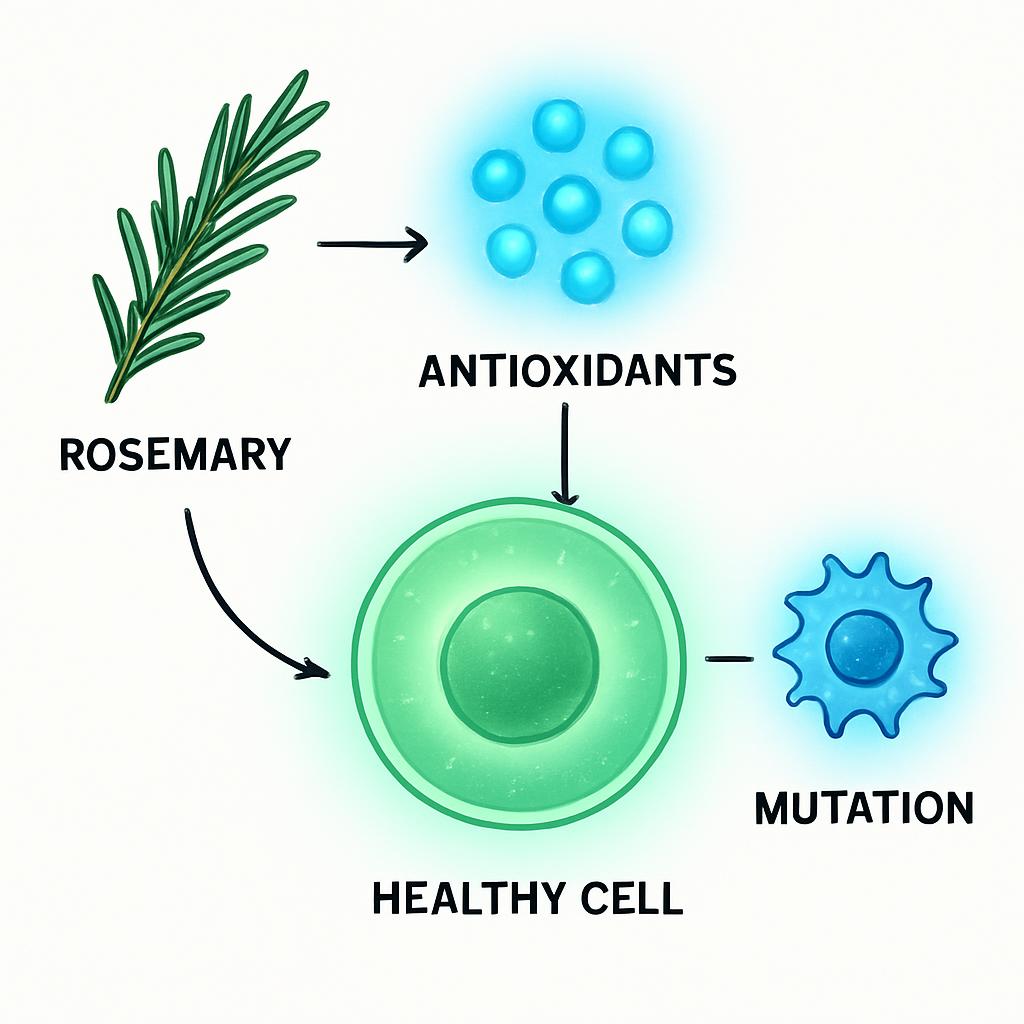
Laboratory and animal studies reveal that rosemary extract may inhibit tumor cell growth and reduce carcinogen activation.
Carnosol and rosmarinic acid can trigger apoptosis (natural cell death) in certain cancer lines.
However, there is no evidence that rosemary prevents or cures cancer in humans. It should be viewed as a supportive dietary antioxidant, not a medical treatment.
Source: PMC7491497 – Rosemary and Cancer Prevention
How to Use Rosemary for Best Results
Using rosemary safely and effectively depends on how it’s prepared. The following methods allow you to enjoy its benefits — from improved focus to better digestion — without exceeding safe limits.
1. As a Culinary Herb (Fresh or Dried)
- How to use: Add ½–1 teaspoon of dried rosemary (or 1 tablespoon fresh) per meal.
- Best with: Roasted vegetables, poultry, potatoes, soups, or infused olive oils.
- Benefits: Adds natural antioxidants and anti-inflammatory compounds without calories.
- Tip: Crush the dried leaves slightly before cooking to release aroma and phytochemicals.
2. As Herbal Tea
- Preparation: Steep 1 teaspoon of dried rosemary leaves (or 2 tsp fresh) in 1 cup of hot water for 5–10 minutes.
- How often: 1–2 cups daily after meals to support digestion and circulation.
- Avoid: Very strong infusions if you’re pregnant or have hypertension.
- Optional: Add lemon or honey for flavor.
3. As Essential Oil (Aromatherapy or Topical Use)
- Aromatherapy: Add 2–3 drops of rosemary essential oil to a diffuser to promote alertness and reduce stress.
- Topical use: Dilute 2–3 drops of rosemary oil in 1 tablespoon of carrier oil (such as coconut or jojoba) for scalp or skin massage.
- Frequency: 2–3 times per week for hair growth or muscle relaxation.
- Important: Always do a patch test before applying to skin.
4. As Dietary Supplement (Capsules or Extracts)
- Typical dosage: 300–600 mg standardized extract daily (depending on manufacturer).
- Best time: With food, to minimize stomach irritation.
- Check label: Look for supplements standardized to 10–20% carnosic acid.
- Caution: Consult your doctor before combining with medications or using long-term.
Possible Side Effects and Precautions
While rosemary is generally safe in culinary amounts, concentrated forms — oils and extracts — can cause side effects or interact with medications.
For YMYL credibility, it’s essential to present these clearly and responsibly.
1. Potential Side Effects
- Digestive discomfort: Large doses may cause nausea or stomach upset.
- Allergic reactions: Rare but possible; symptoms include rash or itching.
- Skin irritation: Essential oil can cause redness if undiluted.
- Seizure risk: Extremely high doses of rosemary oil may trigger seizures in sensitive individuals.
2. Medication Interactions
Avoid rosemary supplements if you take:
- Anticoagulants (blood thinners): e.g., warfarin — rosemary may increase bleeding risk.
- Diabetes medications: It can lower blood sugar and amplify effects.
- Blood pressure or diuretic drugs: May intensify their actions.
- Lithium: Rosemary can alter lithium excretion rates.
Source: WebMD – Rosemary Drug Interactions
3. Pregnancy and Breastfeeding
High-dose use of rosemary essential oil or concentrated extracts should be avoided during pregnancy and while breastfeeding, as they may stimulate uterine contractions. Culinary amounts of rosemary (used as a spice in food) are generally considered safe for most healthy adults. For detailed guidance and safety considerations, refer to the official resource: Are Essential Oils Safe for Pregnancy? – Parents.com
4. Safe Daily Use Summary
| Form | Safe Amount | Frequency | Notes |
|---|---|---|---|
| Culinary herb | ½–1 tsp dried | Daily | Safe for all adults |
| Tea | 1 cup (1 tsp leaves) | 1–2× daily | Avoid strong infusions in pregnancy |
| Essential oil (diluted) | 2–3 drops in 1 tbsp carrier oil | 2–3× weekly | Never ingest |
| Supplement | 300–600 mg | Daily | Consult doctor first |
Frequently Asked Questions (FAQ)
1. Can I use rosemary every day?
Yes, using rosemary in food or as herbal tea daily is safe for most people. Avoid large doses of essential oils or supplements without medical advice.
2. Does rosemary oil really help hair growth?
Research comparing rosemary oil with 2% minoxidil found similar improvements in hair thickness after six months of use — when applied 2–3 times weekly.
3. Is rosemary safe during pregnancy?
Culinary amounts are fine. However, avoid essential oil or concentrated supplements during pregnancy or breastfeeding.
4. Can I drink rosemary tea for digestion?
Yes, it may help relieve bloating and stimulate bile flow. Use moderate strength tea and avoid overconsumption.
5. Does rosemary affect blood pressure?
In some individuals, high doses can raise blood pressure slightly. Consult your doctor if you’re on blood pressure medications.
6. How long does it take to see results from rosemary oil on hair?
Most studies show visible results within 4–6 months of consistent use.
7. Can rosemary prevent Alzheimer’s disease?
While lab studies are promising, there’s no clinical proof yet. Rosemary supports brain health but is not a treatment.
Conclusion
Rosemary is a powerful, science-backed herb that supports memory, mood, skin, and overall vitality — but must be used safely and moderately.
From your kitchen to your diffuser, rosemary’s antioxidants and aromatic compounds can enhance wellness when used consistently.
However, concentrated oils or supplements should be treated with caution — always consult a qualified healthcare provider if you’re pregnant, nursing, or taking medication.
Bottom line:
- Use rosemary regularly in meals or tea for safe, steady benefits.
- Choose quality oils and extracts from trusted brands.
- Follow safe dosages and patch-test topically.
References
- Rahbardar, M. G., & Hosseinzadeh, H. (2020). Therapeutic effects of rosemary (Rosmarinus officinalis L.) and its active constituents on nervous system disorders. PubMed Central (PMC7491497)
- Moss, M., et al. (2012). Inhalation of rosemary aroma increases cognitive performance and mood. PubMed Central (PMC3700080)
- Panahi, Y., et al. (2015). Rosemary oil vs minoxidil 2% for the treatment of androgenetic alopecia: a randomized comparative trial. PubMed Central (PMC4387693)
- Li Pomi, F., et al. (2023). Rosmarinus officinalis and skin: Antioxidant activity and possible dermatological applications. PubMed Central (PMC10045493)
- USDA FoodData Central (2024). Rosemary, fresh — nutrient composition data. United States Department of Agriculture
